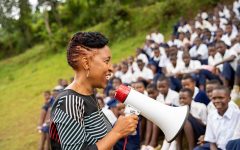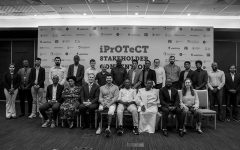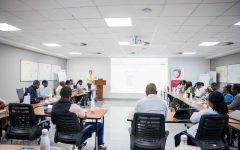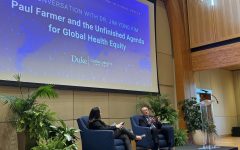Student Profile: UGHE’s Moskovitz Scholar, Gloria Igihozo, Reflects On Learnings from Her MGHD Year
August 7, 2020 2020-08-07 17:47Student Profile: UGHE’s Moskovitz Scholar, Gloria Igihozo, Reflects On Learnings from Her MGHD Year
Student Profile: UGHE’s Moskovitz Scholar, Gloria Igihozo, Reflects On Learnings from Her MGHD Year
This year’s Masters in Science in Global Health Delivery (MGHD) students have had a memorable year. Despite a time of global uncertainty, the pandemic has presented new learning opportunities through University of Global Health Equity’s (UGHE) quality online teaching, offered a new dimension to health curricula, and above all, demonstrated how critical their role is as the future’s global health change-makers to prepare for, and respond to outbreaks of the future.
As students prepare to graduate via a virtual ceremony this Sunday August the 9th, they take with them a robust foundation in health sciences, vital skills in leadership and management to build, repair, and maintain health systems, and an ability to analyze with a biosocial lens the impact of social determinants of health within the rural learning environment of Butaro Campus. Most of all, they go on to become active advocates and participants in the advancement of UGHE’s equity agenda.
As part of UGHE’s ongoing commitment to equity, UGHE established the Moskovitz Scholarship for Women in Global Health Leadership, awarded annually to incoming MGHD candidates who have demonstrated a clear commitment to advancing the status of women, serving the most vulnerable, and a strong desire to advance global health delivery. This year’s scholar was Gloria Igihozo who spoke to us about her personal journey to study at UGHE, her commitment to promoting the wellbeing of the communities around her, and her vision for the future to support women, girls and key populations in Sub Saharan Africa.
***

Q. How were you first introduced to UGHE, and what led you to apply to the MGHD program?
A. I first heard about UGHE from a newspaper article about a graduating UGHE class. The journalist was speaking about how students at UGHE are equipped with the tools and skills to enable them to address the barriers in accessing health care globally. At that time, I was an undergraduate student in the U.S. and was considering medical school. I thought that UGHE aligned with a lot of the things that I was personally passionate about. I was so pleased to find that you were able to apply to the MGHD program without being a medical doctor, and felt that it would be great to be able to do my masters degree back in Rwanda. I was attracted by the fact that UGHE was situated within the very community it was looking to serve, within a rural setting where you could understand and address the unique challenges faced by those in the community. I was also attracted by UGHE’s commitment to equity and to serving marginalized communities.
Q. What learning opportunities within UGHE attracted you?
A. I was attracted by the focus on evidence based interventions. It was immediately clear that UGHE focused on leveraging existing evidence that would promote certain interventions to address the needs of different communities. Personally, I wanted to be more involved with communities, as I knew that is where I wanted to work within the future. I wanted to also make sure that the interventions I would eventually design and implement were aligned with the needs of the community. There was no easy way to do this other than to gather enough evidence from the communities to ensure that I would be able to make recommendations based on community needs, and not assumed needs.
I was also interested in UGHE’s evident commitment to practical learning within communities through the incorporation of field visits into the curricula. This meant that what we learnt in the classroom could be translated into the real world. In other masters programs I originally considered, the curricula had been largely theoretical. For UGHE, it was embedded across all the different courses offered. For instance, you would learn about malnutrition in the classroom, and then go on to do a malnutrition field visit in the community. For someone who didn’t have a medical background like me, some of these concepts were a little abstract. Field visits were a way for our professors to reinforce some of these concepts. It was a great way to shape, and bring to life the curricula.

Q. Was there one field that brought to life the values of equity through the representatives you met or approaches you saw there?
A. One visit that immediately comes to mind is the field visit we did to the indigenous communities of Rwanda, otherwise known as the historically marginalized communities. During our course, we had been discussing how some of the communities that have been historically marginalized are excluded in health interventions. We had also been reading extensively about the indigenous people in the Great Lakes region and the field visit was an opportunity to meet these people. With Dr. Akiki, we had a home visit with one of the families from this community. The father of the family had been attacked the night before we went there. He suffered injuries on the way back to gather enough money to buy books for his kids. He said that there was a health post only ten minutes from his house but that he was afraid to go there because, due to reintegration, many people still considered them to be strangers. I was surprised as these are the indigenous people of the land. It was a powerful experience.
This visit made me understand the importance of community activism, and also the inequities that exist within our society. In terms of access to health care – we talk about distance from the hospital or available resources such as medical equipment as barriers to accessing health services, but this was a different side of the story. It was a way to understand how mistrust or fear in the health care system could be a bigger barrier to people’s access to health care, and health care facilities even when they have serious conditions. Every time I think about global health, I will remember this encounter. It will motivate me to find platforms I could use to amplify the voices of the marginalized communities and to keep brainstorming ways through which I could be of service to them.

Q. The Moskovitz Scholarship for Women in Global Health Leadership is granted annually to an incoming MGHD candidate with a commitment to equity. As this year’s scholar, what did this opportunity mean to you throughout the MGHD year?
A. When I was still an undergraduate, I took two jobs and therefore had little time to study. The fact that I had this scholarship not only facilitated me, financially, to learn at UGHE, but also increased my ability to engage in the classroom, allowed me more time to read into the concepts we discussed and set up one-to-one office hours with my professors. This scholarship allowed me to find the space and opportunity to explore my passions in global health – particularly that of women and child health, two groups integral to the purpose of the scholarship itself.

Q. How do you intend to apply your MGHD learnings in the future? What’s the next step in your journey as a global health leader?
A. I want to focus on research and community development. I’ve realized through this master’s that I have a passion for people and making sure their stories are heard. Research is one way to powerfully highlight the stories and experiences of the communities around us. My practicum project was about access to HIV services for key populations, and as a result, I now want to focus my research on the health seeking experiences of transgender people in Rwanda, as well as injection and drug users, and men who have sex with men. Their stories and experiences are still largely unexplored in Rwanda, and so I’d like to find ways to contribute to the existing knowledge gap in this area and collaborate with people that are already researching this area globally.
I have loved many of our community outreach projects and see this translating into what I do next. I realise that the master’s program has equipped me with the skills to understand their experiences, but also develop programs and interventions that promote the wellbeing of the communities around me. In the far future, I hope to work specifically on accelerating access to health services and education for women and girls. In fact, I want to start an organization that facilitates access to these resources, education and services for women and girls in sub-Saharan Africa.
***
Find out more about the MGHD program and other UGHE learning opportunities here.







